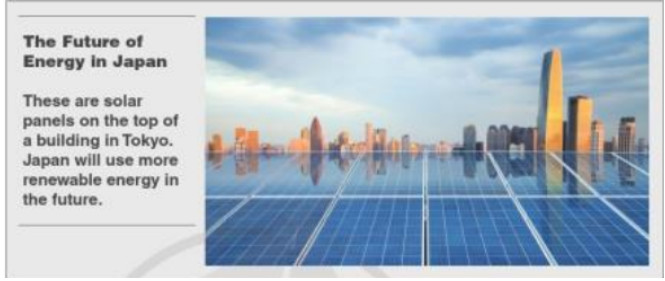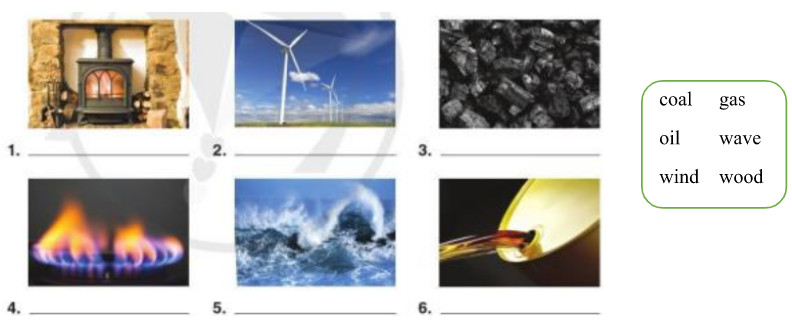Tiếng Anh 10 Unit 8 8C
A. Look at the photo and read about Japan. Then answer the questions. B. Write each type of energy from the box under the matching photo. C. Which types of energy in A and B are renewable and which are non-renewable? Write them in the table below. D. What types of energy does your country use at the moment? E. Put the words in the correct order. F. Listen to a conversation between two people from Japan and Scotland. G. In pairs, change the underlined words and make new conversations about your c
A
Language Expansion: Types of Energy
(Mở rộng ngôn ngữ: Các loại năng lượng)
A. Look at the photo and read about Japan. Then answer the questions.
(Nhìn vào bức ảnh và đọc về Nhật Bản. Sau đó trả lời các câu hỏi sau.)
1. What does the photo show?
(Bức ảnh thể hiện điều gì?)
2. What type of energy will Japan use more in the future?
(Loại năng lượng nào Nhật Bản sẽ sử dụng nhiều hơn trong tương lai?)

Lời giải chi tiết:
1. The photo shows the future of energy in Japan.
(Bức ảnh cho thấy tương lai của năng lượng ở Nhật Bản.)
2. Japan will use more renewable energy in the future.
(Nhật Bản sẽ sử dụng nhiều năng lượng tái tạo hơn trong tương lai.)
B
B. Write each type of energy from the box under the matching photo.
(Viết mỗi loại năng lượng trong khung vào dưới mỗi dưới ảnh phù hợp.)

Phương pháp giải:
- coal (n): than
- oil (n): dầu
- wind (n): gió
- gas (n): khí đốt
- wave (n): sóng biển
- wood (n): gỗ
Lời giải chi tiết:
| 1. wood | 2. wind | 3. coal | 4. gas | 5. wave | 6. oil |
C
C. Which types of energy in A and B are renewable and which are non-renewable? Write them in the table below.
(Loại năng lượng nào ở bài A và B là tái tạo được và không tái tạo được? Viết chúng vào bảng dưới đây.)
|
Renewable Energy (Năng lượng tái tạo) |
Non-renewable Energy (Năng lượng không tái tạo) |
Lời giải chi tiết:
|
Renewable Energy (Năng lượng tái tạo) |
Non-renewable Energy (Năng lượng không tái tạo) |
| wind (gió), wave (sóng biển) | coal (than), oil (dầu), gas (khí đốt), wood (gỗ) |
D
D. MY WORLD (Thế giới của tôi)
What types of energy does your country use at the moment?
(Những loại năng lượng nào mà đất nước của bạn đang sử dụng vào thời điểm hiện tại?)
Lời giải chi tiết:
- My country uses coal, oil, and gas.
(Đất nước tôi sử dụng than, dầu và khí đốt.)
E
Grammar (See Grammar Reference pp. 155-156)
(Ngữ pháp: (Xem Tài liệu Ngữ Pháp trang 155-156))
E. Put the words in the correct order.
(Sắp xếp các từ theo đúng thứ tự.)
1. will / my country / use / wind power ________________________
2. cars / use / won’t / gas ________________________
3. speak / English / most people / will ________________________
4. live / people / won’t / on the Moon ________________________Phương pháp giải:
- Thì tương lai đơn:
+ câu khẳng định: S + will + V_infinitive
+ câu phủ định: S + won’t + V_infinitive
+ câu hỏi Yes / No: Will + S + V_infinitive?
+ câu hỏi có từ để hỏi: Wh- + will + S + V_infinitive?
Diễn tả một dự đoán về 1 việc sẽ xảy ra trong tương lai
Lời giải chi tiết:
1. My country will use wind power.
(Đất nước tôi sẽ sử dụng năng lượng gió.)
Cụm danh từ “My country” (đất nước tôi) làm chủ ngữ
2. Cars won’t use gas.
(Ô tô sẽ không sử dụng xăng.)
Danh từ “Cars” (Ô tô) làm chủ ngữ
3. Most people will speak English.
(Hầu hết mọi người sẽ nói tiếng Anh.)
Cụm danh từ “Most people” (Hầu hết mọi người) làm chủ ngữ
4. People won’t live on the Moon.
(Con người sẽ không sống trên Mặt trăng.)
Danh từ “People” (Con người) làm chủ ngữ
F
Conversation (Optional) (Hội thoại (Tự chọn))
F. Listen to a conversation between two people from Japan and Scotland.
(Hãy lắng nghe cuộc trò chuyện giữa hai người đến từ Nhật Bản và Scotland.)
Rika: I don't think we will use as much non-renewable energy in the next five years, so we'll need lots of solar energy. What about in Scotland? Will you use new types of energy?
Alex: Yes, we will. But we probably won't use a lot of solar energy.
Rika: Will you use wind power?
Alex: Yes, we will. And maybe we'll also use wave energy.
Rika: What's wave energy?
Alex: It's energy from waves in the ocean.
Rika: Wow! That's great.
Phương pháp giải:
Tạm dịch:
Rika: Mình không nghĩ rằng chúng ta sẽ sử dụng nhiều năng lượng không thể tái tạo trong tương lai 5 năm nữa, vì vậy chúng ta sẽ cần rất nhiều năng lượng mặt trời. Còn ở Scotland thì sao? Bạn sẽ sử dụng các loại năng lượng mới chứ?
Alex: Ừ, có chứ. Nhưng có lẽ chúng tôi sẽ không sử dụng nhiều năng lượng mặt trời.
Rika: Bạn sẽ sử dụng năng lượng gió chứ?
Alex: Có chứ. Và có lẽ chúng tôi cũng sẽ sử dụng năng lượng sóng.
Rika: Năng lượng sóng là gì?
Alex: Đó là năng lượng từ những con sóng ở đại dương.
Rika: Chà! Thật tuyệt.
G
G. In pairs, change the underlined words and make new conversations about your country.
(Làm việc theo cặp, hãy thay đổi các từ được gạch chân và tạo ra các cuộc hội thoại mới về quốc gia của bạn.)
Lời giải chi tiết:
A: I don't think we will use as much non-renewable energy in the next five years, so we'll need lots of wind energy. What about in Viet Nam? Will you use new types of energy?
B: Yes, we will. But we probably won't use a lot of nuclear energy.
A: Will you use hydropower?
B: Yes, we will. And maybe we'll also use solar energy.
A: What's solar energy?
B: It's energy from sunlight.
A: Wow! That's great.
Tạm dịch:
A: Mình không nghĩ rằng chúng ta sẽ sử dụng nhiều năng lượng không thể tái tạo trong tương lai 5 năm nữa, vì vậy chúng ta sẽ cần rất nhiều năng lượng gió. Còn ở Việt Nam thì sao? Bạn sẽ sử dụng các loại năng lượng mới chứ?
B: Ừ, có chứ. Nhưng có lẽ chúng tôi sẽ không sử dụng nhiều năng lượng hạt nhân.
A: Bạn sẽ sử dụng năng lượng thuỷ điện chứ?
B: Có chứ. Và có lẽ chúng tôi cũng sẽ sử dụng năng lượng mặt trời.
A: Năng lượng mặt trời là gì?
B: Đó là năng lượng từ ánh sáng mặt trời.
A: Chà! Thật tuyệt.
Goal check
GOAL CHECK – Make Predictions
(Kiểm tra mục tiêu – Đưa ra Dự đoán)
1. Read the questions and write two more in the table. Check (✓) your answers.
(Đọc câu hỏi và viết thêm hai câu vào bảng. Đánh dấu (✓) vào câu trả lời của bạn.)
| Me
(Tôi) |
Partner
(Bạn bên cạnh) |
|||||
|
In the future, do you think … (Trong tương lai, bạn có nghĩ rằng …) |
Yes
(Có) |
Maybe
(Có thể) |
No (Không) |
Yes (Có) |
Maybe
(Có thể) |
No
(Không) |
| 1. most houses will have solar panels?
(hầu hết các ngôi nhà sẽ có các tấm pin mặt trời?) |
||||||
| 2. people will live under the sea?
(con người sẽ sống dưới biển?) |
||||||
| 3. there will be enough food for everyone?
(sẽ có đủ thức ăn cho mọi người?) |
||||||
| 4. summers will be hotter than now?
(mùa hè sẽ nóng hơn bây giờ?) |
||||||
| 5. people will travel to Mars?
(con người sẽ đi đến sao Hỏa?) |
||||||
| 6. the climate will change all over the world?
(khí hậu sẽ thay đổi trên toàn thế giới?) |
||||||
|
7. the air pollution will reduce? (ô nhiễm không khí sẽ giảm?) |
||||||
2. Ask a partner the questions and check (✓) his or her answers. Then compare your answers.
(Đặt câu hỏi cho bạn bên cạnh và đánh dấu (✓) câu trả lời của bạn. Sau đó so sánh các câu trả lời với nhau.)
Lời giải chi tiết:
|
Me (Tôi) |
Partner (Bạn bên cạnh) |
|||||
|
In the future, do you think … (Trong tương lai, bạn có nghĩ rằng …) |
Yes (Có) |
Maybe (Có thể) |
No (Không) |
Yes (Có) |
Maybe (Có thể) |
No (Không) |
|
1. most houses will have solar panels? (hầu hết các ngôi nhà sẽ có các tấm pin mặt trời?) |
✓ | |||||
|
2. people will live under the sea? (con người sẽ sống dưới biển?) |
✓ | |||||
|
3. there will be enough food for everyone? (sẽ có đủ thức ăn cho mọi người?) |
✓ | |||||
|
4. summers will be hotter than now? (mùa hè sẽ nóng hơn bây giờ?) |
✓ | |||||
|
5. people will travel to Mars? (con người sẽ đi đến sao Hỏa?) |
✓ | |||||
|
6. the climate will change all over the world? (khí hậu sẽ thay đổi trên toàn thế giới?) |
✓ | |||||
|
7. the air pollution will reduce? (ô nhiễm không khí sẽ giảm?) |
✓ | |||||
2.
A: In the future, do you think most houses will have solar panels?
B: No, I don’t think so. Many people won’t afford to buy solar panels.
Tạm dịch:
A: Trong tương lai, bạn có nghĩ rằng hầu hết các ngôi nhà sẽ có các tấm pin mặt trời không?
B: Không, tôi không nghĩ vậy. Nhiều người sẽ không đủ tiền để mua các tấm pin mặt trời.













Danh sách bình luận